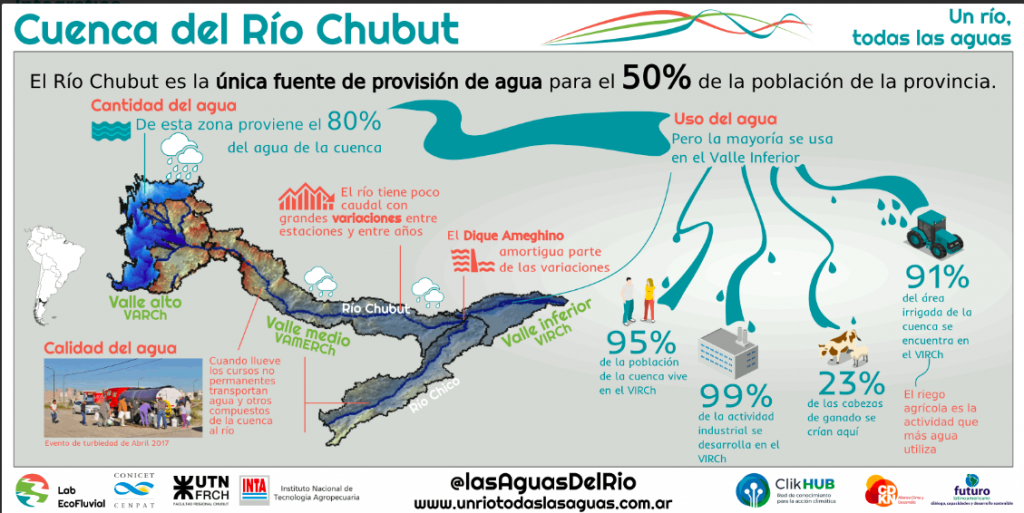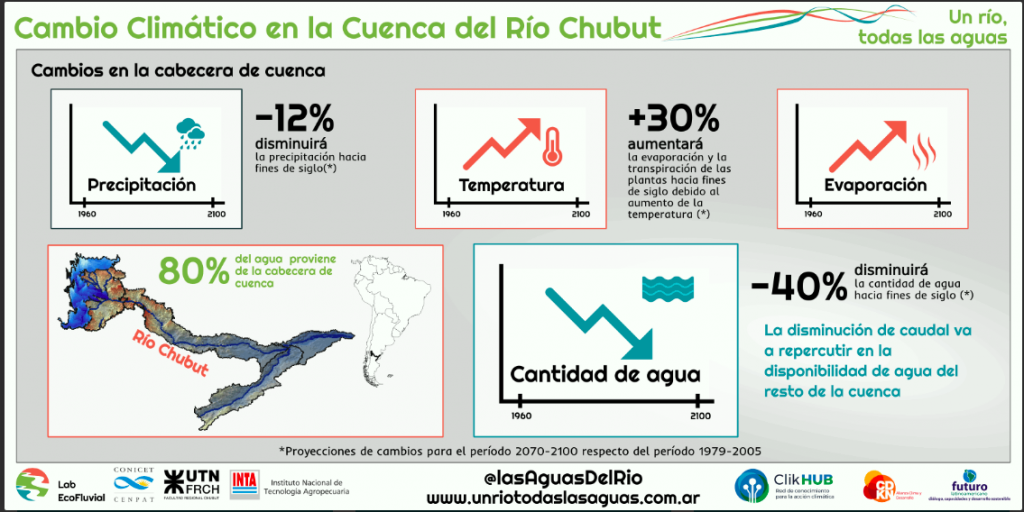'One river, all its water' : Bringing climate and gender perspectives to water management in Patagonia
'One river, all its water' : Bringing climate and gender perspectives to water management in Patagonia
It's challenging to communicate scientific information clearly for use in public policy-making. A group of researchers from Argentina took up the task, and sought to introduce climate and gender concerns into management of the Chubut River basin in Patagonia, Argentina. CDKN’s María José Pacha reports.
Seed funding for an innovative project
The project, Water Management and a Gender Perspective for Tackling Climate Change Impacts in Chubut (Argentina), is one of 100 interesting proposals that were developed by participants attending the course: Effective Communication on Climate Change. The course was run by Climate Knowledge Hub for Latin America (Clik Hub) between May and June 2020. Five projects were selected to receive seed funding for implementation with support from CDKN and FFLA. The projects are currently in progress in Argentina, Chile, Colombia, Ecuador and Peru.
Dr. Natalaia Pessacg and her colleague Dr. Ana Liberoff from Patagonian Institute for the Study of Continental Ecosystems (IPEEC-CCT CONICET CENPAT in Spanish), working alongside a team of scientists from various institutions, have carried out numerous research studies into climate change impacts on the Lower Valley of the Chubut River.
Until now, however, the research findings had not been made accessible to the relevant decision-makers. So this project was born, to communicate the impacts that climate change is having on the quality and quantity of water in the valley and to raise awareness of the need to incorporate gender concerns into regional water policies.
Natalia Pessacg explained that “the project sets out to create connections and spaces for dialogue and reflection among decision-makers; and also drive the understanding that a gender perspective is pivotal to the water problems experienced in the area”.
The project also aims to reinforce the importance of scientific knowledge in the decision-making process. She added: “our work does not end with a research paper but with a transformation between the new knowledge and decision-makers that results in actual contributions to change”.
Chubut River basin and climate change impacts
The region can be characterised as follows:
- The Chubut River basin in Patagonia, Argentina, is made up of three large sub-basins: the Higher Valley (valle superior), the Middle Valley (valle medio) and the Lower Valley (valle inferior). The Chubut River is the only water source for more than 200 000 people, 50% of the population in the province.
- There is a considerable distance between where the water enters the Chubut River basin to where the water is used: the water enters the high basin but the majority of productive, industrial and urban activity happens in the lower basin. The Lower Valley is one of the most important of irrigated valleys in Patagonia. It has many cities and villages that rely on the agricultural economy.
- Agriculture for cattle-farming in the Lower Valley is the highest water consumer in the region. Agriculture in the valley mostly consists of crops for fodder and grazing – which use 92% of the irrigated area. The fields, which are used for vegetable crops, are watered via gravitational methods (such as furrow irrigation).
- In recent decades, there have been climate variable changes that have affected water quantity. Since 1960, temperature increase and reduced rain and water flow have been recorded. This trend will continue in the future.
- By the end of the century, water quantity in the Chubut River is expected to drop by 40% and this will affect the entire basin. Temperature increases will also affect melting of ice in spring which will influence water availability over the seasons.
- Water governance in the Chubut River basin has a simple structure, but most of the positions of power are held by men. Participation of women and other gender identities in positions of authority accounts for less than 10%.

Building bridges
The Chubut River connects and crosses jurisdictions, environments, societies, socio-productive sectors, interests and above all people – with this in mind, two virtual workshops were held in November 2020, called Water Management and Gender Perspective. The workshops addressed the impacts of climate change on the Chubut River and created an opportunity to collectively think about different strategies and actions aimed at the conservation of water resources, to evaluate the effects of climate change and to reflect on the need to incorporate diverse perspectives into management. In the opening talk, Dr. Carolina Vera, Chief of Staff of the Ministry of Science and Technology said, “Disasters are never natural. If there is a disaster, it exists because of a situation of vulnerability that needs to be addressed”.
Under the banner – One River, Many Waters – more than 40 people participated in the virtual meetings. Government employees and scientists looked at case studies, exchanged views and participated in various exercises in a dynamic multi-disciplinarian exchange looking at actions to take now and in the future that consider climate change and the danger it poses to land, water and people.
They also developed various communication products:
- A Research Summary for Water Policy in the Lower Chibut River Valley. These documents provide a clear, simple and concise summary of key scientific findings on the current situation in the basin and the impacts of climate change, factoring in anticipated changes, different perceptions and a gender perspective.
- Three infographics, on (1) the whole Chubut River basin, (2) the lower basin and (3) important data on the effects of climate change on the lower basin.
- An innovative aspect of the project was to use interactive infographics for climate change communication to illustrate the various states of the basin through graphics and animation.
- To support dissemination of the information, they developed a toolkit of graphics, infographics, and presentations for people to use in capacity building with their colleagues.
All these tools can be found on the project webpage: One River, Many Waters [in Spanish].

Gender – a crucial element
Climate change affects women in a specific way, mainly due to the culturally assigned roles women play. For example, women look after the home and family, so they are more exposed to risks as they are bound to the home in this region. Climate disasters such as floods mainly affect the poor and 70% of the poor in the world, are women.
The Find Yourself through Diversity Foundation were tasked to tackle the topic and train the team as well as facilitate the online workshops. Florencia Fisch from the foundation coordinated the workshop content and said that “participating in the project made me realise that climate change, our rivers and waters are important to me, I began to think about how I can contribute towards a more equitable future, also in terms of natural resources”.
As the process progressed, the researchers began to reconsider their way of working – as well as their behaviour overall. In an article titled Lessons Gained, Pessacg expressed it as follows: “a gender perspective can be applied to many contexts. Not only is it relevant to our scientific work but it is also applicable to us as people. What we learned and discussed was extremely inspiring to me, not just in terms of my work but also my personal life”.
Although the results of this work are difficult to quantify, the participants highlighted the importance of having made new connections and the commitment of the participants to continue working together.
“I believe a fundamental gain was that of opening channels of communication for dialogue between science, civil society, the state and communities – in search for new solutions or understandings of the problems in collaboration with each other. A real commitment and genuine interest within the research team brought us together to learn and teach, listen and share, ask questions and contribute knowledge,” said Fisch.
Image, above right: higher valley of the Chubut River, courtesy Gobierno del Chubut
